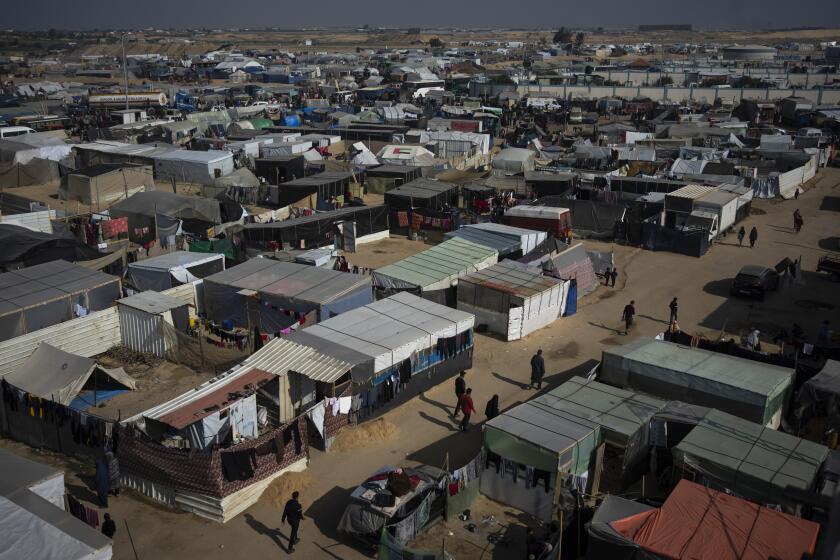SOUTH PACIFIC : No Nukes, No Ties: U.S. and Old Ally Mend Fences
Another Cold War is warming.
Two of the world’s least-likely antagonists--Washington and Wellington--are slowly moving closer again after six years of diplomatic snubs, name-calling and saber-rattling.
Officials on both sides have begun to increase political contacts frozen since 1985. “It is important we are not seen as a modern-day Albania hiding in the South Pacific,” says Foreign Minister Don McKinnon.
The two have been estranged since then-Prime Minister David Lange’s Labor government banned nuclear-powered or nuclear-armed ships from this island nation.
It mattered not that few U.S. warships, nuclear or otherwise, visited this rugged land. American officials feared the “anti-nuclear virus” might spread to Australia, Japan or even allies in Europe and create problems for U.S. policy.
So then-President Ronald Reagan declared a kind of quarantine. Washington effectively suspended New Zealand from the ANZUS (Australia, New Zealand, United States) security alliance. In official parlance, New Zealand was a friend but no longer an ally.
The Pentagon stopped virtually all contact, including joint training and exercises, logistic support and preferential sales of arms and equipment. Sharing of intelligence was halted. So was high-level political contact.
“The U.S. treats New Zealand the way it treats Cuba, North Korea and Yemen,” said Graham Fortune, deputy secretary for political affairs in the Ministry of External Relations and Trade. “It’s an anomaly.”
Consular and commercial matters are mostly unaffected. Two-way trade has gone up, and officials have worked closely at the World Bank, the Uruguay Round of GATT talks, and on hard-fought treaties to curb drift-net fishing and exploitation of Antarctica.
But the official cold shoulder means elected officials of the Western democracy that fought at America’s side in four wars have been banned from the White House for six years.
“It’s all a bit childish,” said Rod Alley, a political scientist at Victoria University. “When you look at the petty Third World dictators who’ve been welcomed to the White House, you have to laugh.”
Lange resigned in 1988. After several weak Labor governments, the Conservative National Party won power in a landslide last October with a mandate that included improved relations with Washington.
“We recognized the status of the U.S. as a Pacific power . . . was a reality,” McKinnon said.
New Zealand quickly sent two Hercules transport aircraft and medical teams to support the military buildup in the Persian Gulf. Wellington’s ambassador was briefed, in turn, at the White House, and President Bush spoke by phone with Prime Minister Jim Bolger.
Since then, McKinnon has visited Washington, and he met with Secretary of State James A. Baker III in June in Kuala Lumpur. Then came a visit here by U.S. Assistant Secretary of State Richard Solomon, the highest-ranking envoy to arrive since the ban.
“The dialogue and atmospherics have gotten a lot better,” said a U.S. diplomat here. But he said that full defense and intelligence ties cannot be restored until the nuclear ban is repealed. And that isn’t about to happen.
Polls show the anti-nuclear policy remains popular. One reason is public hostility to French nuclear weapons testing in the Pacific. As a result, Bolger says he won’t lift the ban.
“The prospects of repealing the anti-nuclear policy are . . . pretty remote,” said David Holborow of the New Zealand Institute of International Affairs.
But McKinnon has begun a campaign to change public opinion. In a speech last week, he argued that New Zealand is “in great danger of slipping into irrelevance.”
Nuclear Freeze-Out
U.S.-New Zealand relations have been strained since 1985, when Wellington banned visits by nuclear-powered or nuclear-armed ships. Population: 3.39 million Area: 103,415 square miles (size of Colorado) Monetary unit: New Zealand dollar Languages: English, Maori Religions: Anglican, Presbyterian, Roman Catholic, others Economic activity: Agriculture (barley, potatoes, wheat and maize; sheep and cattle), mining (coal, gold, iron and silica), manufacturing (food products, textiles and clothing, wood and paper products, chemicals metals and metal products, machinery and transportation equipment), energy (natural gas, petroleum) and tourism.
Source: Reuters “Tradeline”
More to Read
Sign up for Essential California
The most important California stories and recommendations in your inbox every morning.
You may occasionally receive promotional content from the Los Angeles Times.







